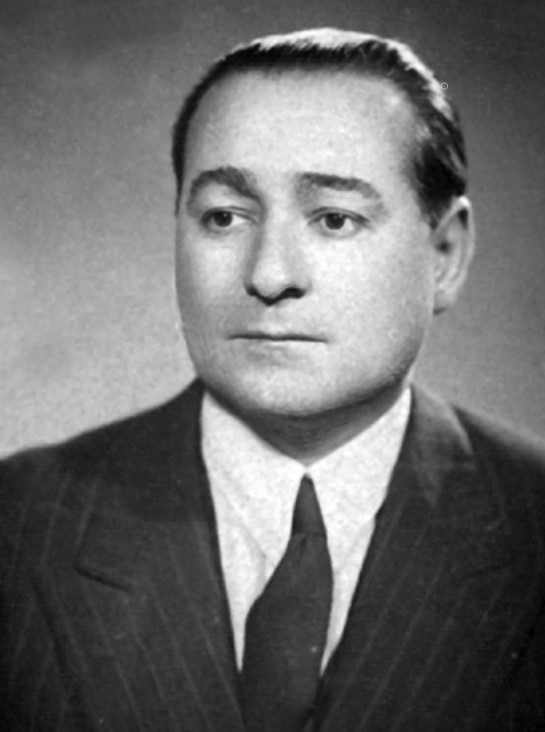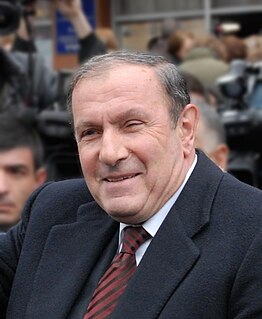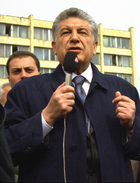
Vazgen Sargsyan was an Armenian military commander and politician. He was the first Defence Minister of Armenia from 1991 to 1992 and then from 1995 to 1999. He served as Armenia's Prime Minister from 11 June 1999 until his assassination on 27 October of that year. He rose to prominence during the mass movement for the unification of Nagorno-Karabakh with Armenia in the late 1980s and led Armenian volunteer groups during the early clashes with Azerbaijani forces. Appointed Defence Minister by President Levon Ter-Petrosyan soon after Armenia's independence from the Soviet Union in late 1991, Sargsyan became the most prominent commander of Armenian forces during the Nagorno-Karabakh War. In different positions, he regulated the military operations in the war area until 1994, when a ceasefire was reached ending the war with the de facto unification of Nagorno-Karabakh Republic with Armenia.

Constituent Assembly elections were held in the Democratic Republic of Georgia between 14 and 16 February 1919. The electoral system used was party-list proportional representation using the D'Hondt method in a single nationwide district. The result was a victory for the Social Democratic Labour Party of Georgia, which won 81% of the vote, and 109 of the 130 seats. In by-elections held in spring, they lost four seats and the Armenian Party in Georgia - Dashnaktsitiuni and the Georgian National Party both won seats.

Presidential elections were held in Georgia on 5 November 1995. The result was a victory for Eduard Shevardnadze of the Union of Citizens of Georgia, who won 77.0% of the vote, with a 68.3% turnout.

The 2003 Armenian Presidential election took place in Armenia on 19 February and 5 March 2003. No candidate received a majority in the first round of the election with the incumbent President Robert Kocharyan winning slightly under 50% of the vote. Therefore, a second round was held and Kocharyan defeated Stepan Demirchyan with official results showed him winning just over 67% of the vote. However both the opposition and international observers said that the election had seen significant amounts of electoral fraud and the opposition did not recognise the results of the election.

General elections were held in Turkey on 10 October 1965. The result was a victory for the Justice Party, which won 240 of the 450 seats. Voter turnout was 71.3%.

General elections were held in Turkey on 2 May 1954.The electoral system used was the multiple non-transferable vote. The result was a victory for the Democrat Party, which won 503 of the 541 seats. Voter turnout was 88.6%.
General elections were held in Lebanon between 12 July and 9 August 1953, the first under the new electoral system which allowed candidates to win with a plurality of votes, rather than requiring a second round. Independent candidates won the majority of seats. Voter turnout was 50.0%.
General elections were held in Lebanon between 16 and 30 April 1972. Independent candidates won the majority of seats, although most of them were considered members of various blocs. Voter turnout was 54.4%.
General elections were held in Lebanon between 23 August and 11 October 1992, the first since 1972. Independent candidates won the majority of seats, although most of them were considered members of various blocs. Voter turnout was 30.3%.
General elections were held in Lebanon between 18 August and 15 September 1996. Independent candidates won the majority of seats, although most of them were considered members of various blocs. Voter turnout was 43.3%.

An independence referendum was held in the Republic of Armenia on 21 September 1991, and was to determine if voters were in favour of independence from the Soviet Union. A total of 99.5% of voters voted in favour. Turnout was 95.0%.

Parliamentary elections were held in Armenia on 20 May 1990, although further rounds were held on 3 June and 15 July due to low turnouts invalidating earlier results and by 21 July 64 seats were still unfilled, with 16 still unfilled in February the following year. The result was a victory for the Communist Party of Armenia, which won 136 of the 259 seats. The remaining candidates were all officially independents, but almost all were members of the Pan-Armenian National Movement. Overall voter turnout was 60.2%.

Parliamentary elections were held in Armenia on 5 July 1995, with a second round on 29 July. There were 150 constituency seats and 40 elected on a national basis using proportional representation. The result was a victory for the Republican Bloc, which won 88 of the 190 seats. Overall voter turnout was 54.3%.

Parliamentary elections were held in Armenia on 30 May 1999. There were 75 constituency seats and 56 elected on a national basis using proportional representation. The result was a victory for the Unity Bloc, which won 62 of the 131 seats. Overall voter turnout was 51.7%.

Presidential elections were held for the first time in Armenia on 17 October 1991. The result was a victory for Levon Ter-Petrossian, who won 83% of the vote. Turnout was 70%.

Presidential elections were held in Georgia on 26 May 1991. The result was a victory for Zviad Gamsakhurdia of the Round Table-Free Georgia party, who won 87.6% of the vote, with an 82.9% turnout.

Presidential elections were held in Georgia on 9 April 2000. The result was a victory for Eduard Shevardnadze of the Union of Citizens of Georgia, who won 82.0% of the vote, with a 75.9% turnout.

A referendum on extending the presidential term of Nursultan Nazarbayev was held in Kazakhstan on 29 April 1995. Voters were asked "Do you agree to prolong the term of office of the President of the Republic of Kazakhstan Nursultan Nazarbayev, publicly elected on 1 December 1991, until 1 December 2000?" The question was approved by 95.5% of voters, with turnout reported to be 91.2%.

A national vote of confidence in President Ziaur Rahman was held in Bangladesh on 30 May 1977. Voters were asked "Do you have confidence in President Major General Ziaur Rahman BU and the policies and programs adopted by him?" The result saw 98.9% vote yes, with a turnout of 88.1%.












